China is effectively enforcing an air defense identification zone (ADIZ) in the South China Sea, a Philippine justice said at a Washington, D.C.-based think tank last week.
Since China enforced an ADIZ – a publicly defined area where unidentified aircraft can be interrogated or intercepted before entering sovereign airspace – in the East China Sea, many have speculated that it is only a matter of time before Beijing will impose one in the South China Sea as well.
But Antonio Carpio, a senior associate justice of the Supreme Court of the Philippines, said at a lecture at the Center for Strategic and International Studies that China was already effectively enforcing a quasi-ADIZ in the South China Sea. Any Philippine plane that flies over the Spratlys, Carpio explained, now receives a stern warning from China via radio to “stay away from the area.”
“They are in fact implementing an ADIZ over the Spratlys now,” Carpio said.
The quasi-ADIZ, Carpio said, was part of China’s grand design to control the South China Sea and the resources therein. Beijing’s behavior over the past few years, he argued – from the harassment of the fishing vessels from other claimant states to the building of artificial islands – clearly illustrates that it wants all the fisheries, oil, gas and mineral resources within the 9-dashed lines and intends to use the features it controls as strategic outposts for military advantage.
“China’s grand design is to control the South China Sea for economic and military purposes,” he said.
The Philippines’ ability to respond to this militarily, Carpio admitted, was quite limited since it was no match for China, which he said was mass-producing warships at a faster rate than any country in world history during peacetime. Manila was also careful to calibrate its response since Beijing had been known to meet Philippine actions – such as the arrests of fishermen – with overwhelming reactions like seizing entire features.
“So we are very careful because that is the strategy of China. And we are no match for China militarily,” he said.
Carpio stressed the importance of the Philippines’ current legal case against China to declare its notorious nine-dash line invalid. If the international community fails to challenge Beijing’s actions, he warned, it risks undermining the rule of law and leading instead to the “rule of the naval cannon,” with an arms race among coastal states.
“Resources that we need that we’ve been putting for education, infrastructure, social services will have to be realigned and devoted to acquiring warships and missiles, and we don’t want to do that,” he said.
Despite indications from China that it would ignore the tribunal’s decision, Carpio said the international community could help pressure Beijing to abide by it since the Chinese government realizes it needs the world in order to preserve the country’s reputation and sustain its prosperity.
“When the cost of non-compliance far outweighs the cost of compliance, then China will comply,” he said.
































